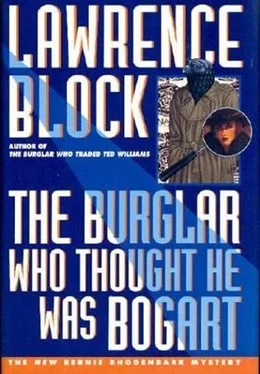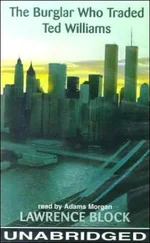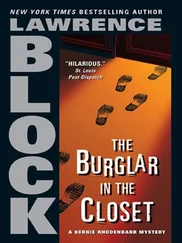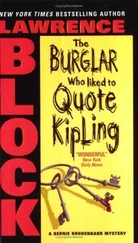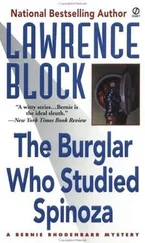This wasn’t the identical operation to grand theft auto, but it requires a similar instrument, and I didn’t have one on hand. I tried to get in without it and kept coming teasingly close, which in turn kept me trying. It finally dawned on me that I was spending far too much time in plain sight on a fire escape, whereupon I used the glass cutter on my tool ring and cut out one of the window’s little panes. I reached in, turned the latch, and let myself in.
I was in there for hours. It was stuffy at first, but I opened a window in the front room, and the pane I’d removed in the rear provided good cross-ventilation. It didn’t take me long to find the spot where Cappy Hoberman had lain bleeding. They hadn’t outlined the body in tape or chalk. They don’t do that anymore, preferring to have the crime scene photographer expose a few rolls of film before they move the body. But they hadn’t done anything about the blood, either, and a lot of it had soaked into the carpet.
I stood there and looked at it. He’d died on the Aubusson, and his blood hadn’t done a lot for the rug’s appearance. Even if you assumed that Candlemas had bought the rug from someone other than its rightful owner, he must have paid a good sum for it. It looked terrible now, but somebody someday would be able to get the stains out. They’ve got all sorts of chemicals and enzymes available, and nowadays they can get blood out of anything, even a turnip.
But they couldn’t pump it back into Hoberman.
I walked around the apartment, running alternate scenarios through my mind. Hoberman gives Charlie Weeks the bone carving of the mouse, cuts his visit short, and returns to this apartment. By cab, natch, since he didn’t have me along to urge him to walk. Something he says or does moves Candlemas to kill him. Candlemas grabs something sharp-this letter opener, say, or one of these Sabatier knives from the kitchen, or some other implement even better suited to dispatching a visitor. Candlemas strikes, Hoberman crumples and falls, and Candlemas slips out and legs it over to Second Avenue, looking to buy Hefty bags and a Skilsaw.
Then what?
Earlier, Weeks and I had spun out a theory in which Candlemas got home, found the cops on the scene, muttered, “Curses, foiled again!” and stole off into the night. But his own death put a different light on things. When he left Hoberman bleeding, he evidently encountered someone. Maybe he went to the wrong person for help, or maybe someone was lying doggo, waiting for him.
Maybe it was that person who made the 911 call that sent the cops to Seventy-sixth Street. In any case, the cops came. Hoberman, the way I figured it, was still breathing when Candlemas took a powder. His wounds were mortal, and he was alive but not lively, probably inert and unconscious. Somewhere along the way he rallied and wrote six unfathomable letters on my heretofore blameless attaché case, using his own life’s blood for ink. Then, perhaps even as the Keystone Kops were sending out for a locksmith, the valiant captain breathed his last.
It was probably around that time, too, that I was downstairs myself, wondering what had happened to Candlemas and considering a little illegal entry of my own. Even loopy with Ludomir, I’d been able to spot that for a bad idea. A good thing, too, considering what I would have walked in on. I could have saved the city the price of a locksmith’s house call, but I’d have had a lot of explaining to do, and my task wouldn’t have gotten all that much easier when the attaché case turned out to be mine.
The new scenario was pretty reasonable, I decided, and a substantial improvement over the one Charlie Weeks and I had hatched the previous morning. It made the mysterious telephone call to the police a little less inexplicable, and fit the dying message into a logical time frame.
But it didn’t do a whole lot to decode it.
C-A-P-H-O-B. What the hell could it mean?
I thought about it as I ambled to and fro, opening drawers and rummaging around in them, exploring closets, looking inside and beneath and behind this and that and the other thing. I was glad to have something to ponder, because this was the worst way to search a place.
The best way is when you know what you’re looking for and where it is. You go in, get it, and get out. Almost as good is when you know what you’re looking for; you go through the place systematically, checking those locations where it’s likely to be, and as soon as you find it you get to go home.
The next best thing-and probably the most enjoyable-is when you’re not looking for anything in particular. Missions of this sort are burglary at its best, and they run the gamut from the meticulously planned suburban break-in, where you time the neighborhood security patrol and run rings around the electronic alarm system, to a completely impulsive crime of opportunity, where you kick the door in and hope for the best. You don’t know what they’ve got or where they put it, but you get to be Goldilocks, sleeping in all the beds and eating all the porridge, and you never know what you’re going to find until you find it.
And, finally, we have the kind of fool’s errand I was on this lovely Sunday. I didn’t know what I wanted or where he’d stashed it, or even if it existed, whatever it might turn out to be. I had to look everywhere, because I didn’t know how big or small it was, or if it had to be kept cold or dry or out of drafts.
And it’s terribly frustrating. If you find something, is that it? Or is there something more waiting to be found? Conversely, if you don’t find anything, do you keep at it until something turns up? Or should you go on home because there’s nothing there?
You know what it’s like? Sex without orgasm. How can you tell when you’re supposed to stop?
So I was almost glad to have CAPHOB to think about while I searched. I wouldn’t call my musing terribly productive, but I came up with some interesting ideas.
1. Suppose CAPHOB was an acronym. Suppose each letter stood for a word. That would be a good way to compress a lot of information into the number of letters you could fit on the side of an attaché case before your life trickled out of you. Just what the letters stood for was hard to say, but the possibilities were extensive, surely. Can Anyone Pinch Hit Or Bunt? Criminal Activity Pays Horribly On Balance. Cancel Anniversary Party-Having Our Baby! None of these struck me as the sort of thing I’d be likely to choose as my last word to the world, but I hadn’t been lying there bleeding, struggling to scribble my barbaric yawp over the roofs of the city.
2. Suppose CAPHOB was upside down. After all, I didn’t know how Hoberman had spent the years since his adventures in Anatruria. Maybe he’d devoted some of them to a career selling life insurance, until jotting things down upside down had become second nature to him. To test the hypothesis, I printed CAPHOB and turned the piece of paper upside down, and I got the same meaningless word upside down and backwards. Then I printed the individual letters upside down, and this worked a little better, because four of the letters were unchanged. What I got looked something like CVdHOB, except the V was really an upside-down A. I suppose I could have taken this a step further and tried to work out what CVDHOB might be an acronym for, but you have to draw the line somewhere.
3. Maybe the most obvious explanation was the real one, and he’d been trying to write his name. This did make a certain kind of sense, actually. There’d been no identification found on his person, which suggested that Candlemas might have taken his wallet from him while he lay dying. Maybe Hoberman had recoiled at the thought of rotting away in an unmarked grave, and wanted to let the world know who he was. When you considered the fact that even now the tag on his toe read “Hugo Candlemas,” his concern didn’t seem so farfetched. It was a damned unsatisfying dying message, pointing not to the killer but to the victim, but what are you going to do, send it back to Hoberman with a rejection slip?
Читать дальше
